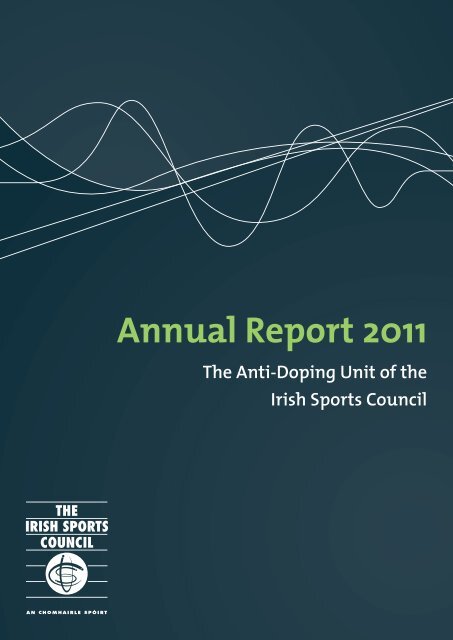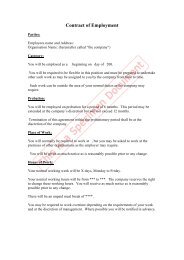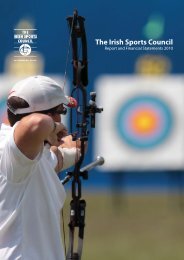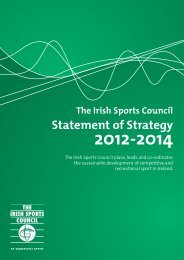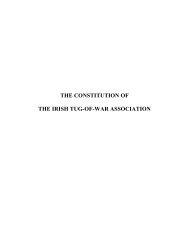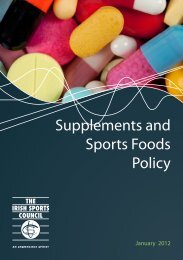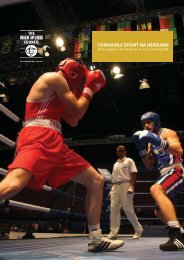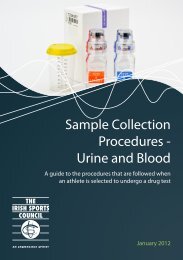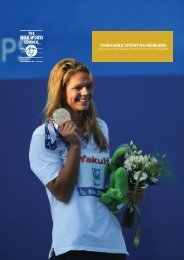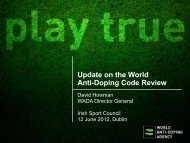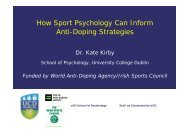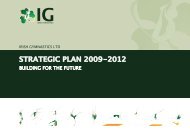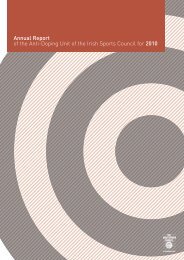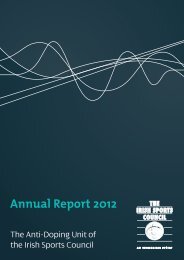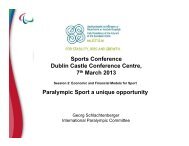Anti-Doping Committee - The Irish Sports Council
Anti-Doping Committee - The Irish Sports Council
Anti-Doping Committee - The Irish Sports Council
- No tags were found...
You also want an ePaper? Increase the reach of your titles
YUMPU automatically turns print PDFs into web optimized ePapers that Google loves.
Annual Report 2011<strong>The</strong> <strong>Anti</strong>-<strong>Doping</strong> Unit of the<strong>Irish</strong> <strong>Sports</strong> <strong>Council</strong>
PAGE 2 ANTI-DOPING ANNUAL REPORT 2011
Table of ContentsIntroduction...............................................................................................................6Foreword......................................................................................................................8Background...............................................................................................................10Testing.........................................................................................................................16Education and Research......................................................................................24Research.....................................................................................................................34International............................................................................................................36Administration.......................................................................................................40<strong>The</strong> Year Ahead.......................................................................................................44Appendix..................................................................................................................46ANTI-DOPING ANNUAL REPORT 2011PAGE 3
ANTI-DOPING ANNUAL REPORT 2011PAGE 5
Introduction<strong>The</strong> <strong>Irish</strong> <strong>Sports</strong> <strong>Council</strong> is committed to developing healthy, fair and enjoyable sport.Its <strong>Anti</strong>-<strong>Doping</strong> Programme is an essential ethical foundation to <strong>Irish</strong> sport. Specificallyin an Olympic and Paralympic year is it important the everyone in sport and the widercommunity can have confidence that Ireland has one of the best anti-doping programmesin the world and that this fact enhances the reputations of <strong>Irish</strong> teams competing abroad.This is the twelfth annual report of the <strong>Anti</strong>-<strong>Doping</strong> Unit of the <strong>Irish</strong> <strong>Sports</strong> <strong>Council</strong>. Itprovides details of the activities of the Programme in 2011 including on the financial costof the programme. In 2011 the Programme cost €1,215,347 which includes the salaries ofthe four full time members of staff. Tribute should be paid to the staff for keeping the costof this essential programme which is operated to a very high standard of efficiency andeffectivenessIt is the <strong>Council</strong>'s long standing belief that the only way to ensure a long term successin the battle against doping is through an international and multi-lateral approach. It isthrough the World <strong>Anti</strong>-<strong>Doping</strong> Agency (WADA) and its partnerships with internationalfederations and national governments that cheating will be eliminated from elite sport.We welcome the appointment of Kenneth Egan as an Observer to WADA's Athlete<strong>Committee</strong>, another notable recognition for Ireland in the international arena ofantidoping. Our colleagues in the <strong>Anti</strong>-<strong>Doping</strong> Unit continue to introduce new initiativesto ensure the <strong>Irish</strong> Programme remains as one the of the best in the world. In 2011 it wasnotable for the extensive work in the area of education. Significant new resources intechnology as well as more traditional media were offered in 2011 and reached a very wideaudience.It is worth noting that the interest of the national media in anti-doping ensures that theissues get well debated in the public. This is very welcome as it ensures that in Irelandthere is a very high degree of public awareness and knowledge of anti-doping matters.<strong>The</strong> <strong>Council</strong> relies on the good will and cooperation of National Governing Bodies andathletes. We sincerely appreciate all of those efforts and note the long-term and ongoingsupport of the community of <strong>Irish</strong> sport for our efforts in this important policy area.PAGE 6 ANTI-DOPING ANNUAL REPORT 2011
<strong>The</strong> executive led by Dr May, provides an outstanding service to <strong>Irish</strong> sport. Prof BrendanBuckley, as Chairman of the <strong>Anti</strong>-<strong>Doping</strong> <strong>Committee</strong>, continues to provide outstandingleadership to the programme and his contribution is sincerely appreciated. Prof Buckleyand his <strong>Committee</strong> provide dedicated service to the <strong>Council</strong>. <strong>The</strong>y are supported by manydistinguished individuals who serve on various disciplinary, appeals and TUE committees.We appreciate their service and commitment to the Programme and to the wider interestof <strong>Irish</strong> sport.Kieran MulveyChairmanJohn TreacyChief ExecutiveANTI-DOPING ANNUAL REPORT 2011PAGE 7
ForewordDuring 2011 the <strong>Irish</strong> Sport <strong>Anti</strong>-<strong>Doping</strong> Programme continued to make substantialprogress in the operational areas of testing, education, administration and research. Thisreport, the twelfth Annual Report of the Programme, details those activities.As this report indicates the <strong>Irish</strong> <strong>Sports</strong> <strong>Council</strong> is relentless in its campaign against theuse of performance enhancing substances in sport. We are determined to continue thefight and recognise that it will be a long term battle. We are sustained in the battle bytheknowledge that the vast majority of athletes compete clean and it is their reputationsthat we seek to protect.In Ireland there is a strong consensus against the use of drugs in sport and an agreementthat doping devalues sport and that it destroys the achievements of those who engage init. Our mandate, through the establishing Act, arises from this consensus. It is reinforcedeach year by the support we receive from within the sports community as we carry outthe necessary functions of the Programme.<strong>The</strong> World <strong>Anti</strong>-<strong>Doping</strong> Agency (WADA) continues to lead internationally in the fight forfairness in sport. Ireland is a strong supporter of WADA's multi-national, multi-agencyapproach as the only way to win the global battle against doping. We contribute veryactively to WADA in the formation of policy, in the development of standards and in thepractical implementation of the World <strong>Anti</strong>-<strong>Doping</strong> Code. We do this to ensure, as best aspossible, that <strong>Irish</strong> athletes compete internationally against 'clean' athletes.<strong>The</strong> continued support of national governments is central to the success of WADA. <strong>The</strong><strong>Anti</strong>-<strong>Doping</strong> <strong>Committee</strong> acknowledges and is deeply appreciative of the support of the<strong>Irish</strong> Government and the officials at the Department of Sport.We would also like to acknowledge the unanimous support within <strong>Irish</strong> sport for the<strong>Irish</strong> Sport <strong>Anti</strong>-<strong>Doping</strong> Programme. <strong>The</strong> National Governing Bodies of sports continue tocommit considerable work and dedication to their <strong>Anti</strong>-<strong>Doping</strong> programmes. In additionmost of our activity is conducted directly with sports people and we thank them for theirongoing support and co-operation.PAGE 8 ANTI-DOPING ANNUAL REPORT 2011
<strong>The</strong> executive of the <strong>Irish</strong> <strong>Sports</strong> <strong>Council</strong>'s <strong>Anti</strong>-<strong>Doping</strong> Unit deliver a world classprogramme. <strong>The</strong>ir work is acknowledged internationally as being of the highest standard.Also, I would like to express my gratitude to my colleagues on the <strong>Committee</strong> all ofwhom volunteer their time and expertise. We are privileged to be able to draw on theenergy, time and expertise of the members of the <strong>Anti</strong>-<strong>Doping</strong> <strong>Committee</strong>. Similarly,the <strong>The</strong>rapeutic Use Exemption Sub-<strong>Committee</strong> continues to make an outstandingcommitment of medical expertise. All have made a major contribution to the work of the<strong>Council</strong>. It continues to be my privilege to work with them.Professor Brendan BuckleyChairman<strong>Anti</strong>-<strong>Doping</strong> <strong>Committee</strong>ANTI-DOPING ANNUAL REPORT 2011PAGE 9
BackgroundList of AbbreviationsAAFADOADUANADOERCIADRIFICIMBISADDPISCISTUEMIMSNADONGBOOCOTCRCSIRTPSCPTUEUCDWADAAdverse Analytical Finding<strong>Anti</strong>-<strong>Doping</strong> Officer<strong>Anti</strong>-<strong>Doping</strong> UnitAssociation of National <strong>Anti</strong>-<strong>Doping</strong> OrganisationsEuropean Rugby Cup<strong>Irish</strong> <strong>Anti</strong>-<strong>Doping</strong> RulesInternational FederationIn-Competition<strong>Irish</strong> Medicines Board<strong>Irish</strong> Sport <strong>Anti</strong>-<strong>Doping</strong> Disciplinary Panel<strong>Irish</strong> <strong>Sports</strong> <strong>Council</strong>International Standard for <strong>The</strong>rapeutic Use ExemptionsMonthly Index of Medical SpecialitiesNational <strong>Anti</strong>-<strong>Doping</strong> OrganisationNational Governing BodyOut-of-CompetitionOver the CounterRoyal College of Surgeons in IrelandRegistered Testing PoolSample Collection Personnel<strong>The</strong>rapeutic Use ExemptionUniversity College DublinWorld <strong>Anti</strong>-<strong>Doping</strong> AgencyPAGE 10 ANTI-DOPING ANNUAL REPORT 2011
Visions of the Programme<strong>The</strong> visions of the <strong>Irish</strong> Sport <strong>Anti</strong>-<strong>Doping</strong> Programme are:TestingTo provide an effective, quality-driven testing programme.EducationTo facilitate the development and delivery of quality education programmes for all majorstakeholders.ResearchTo establish a long-term research programme which compliments and progressesantidoping research nationally and internationally.InternationalTo keep abreast of international best practice and to collaborate with relevantinternational initiatives.AdministrationTo develop and maintain quality standards to ensure correct and transparentadministrative procedures.Background to the <strong>Irish</strong> Sport <strong>Anti</strong>-<strong>Doping</strong>Programme<strong>The</strong> <strong>Irish</strong> <strong>Sports</strong> <strong>Council</strong> is mandated by legislation (the <strong>Irish</strong> <strong>Sports</strong> <strong>Council</strong> Act, 1999) totake appropriate actions to combat doping in sport.What is 'appropriate' is determined by the Country's ratification of the UNESCOConvention Against <strong>Doping</strong> in Sport which effectively binds the government to theimplementation of a fully functioning National <strong>Anti</strong>-<strong>Doping</strong> Programme which complieswith all of the relevant articles of the World <strong>Anti</strong>-<strong>Doping</strong> Code. <strong>The</strong> World <strong>Anti</strong>-<strong>Doping</strong>Code continues to be the cornerstone of the world-wide fight against doping in sport. InIreland this Code is reflected in, and consequently implemented through the <strong>Irish</strong> <strong>Anti</strong>-<strong>Doping</strong> Rules.ANTI-DOPING ANNUAL REPORT 2011PAGE 11
After a year of significant change in 2009 (a revised Code was released in late 2008),2010 was a year of consolidation where the changes to the Code and Rules had a chanceto settle down. <strong>The</strong> impacts of some of those changes were also better understood by2010 and as a result some further changes were made to the Rules during the year.After consultation with NGBs a significant change was made in how <strong>The</strong>rapeutic UseExemptions are dealt with at the national level. <strong>The</strong> necessary resolution amending theRules was passed by the members of the Board of the <strong>Irish</strong> <strong>Sports</strong> <strong>Council</strong> in June 2010.A second amendment to the <strong>Irish</strong> <strong>Anti</strong>-<strong>Doping</strong> Rules was passed in December 2010 whichfacilitates an expansion of the number of panel members on the <strong>Irish</strong> Sport <strong>Anti</strong>-<strong>Doping</strong>Disciplinary Panel. Once the additional places are filled there will be greater flexibility inthe preparation of hearings ensuring less delay in the hearing of cases.<strong>Anti</strong>-<strong>Doping</strong> <strong>Committee</strong><strong>The</strong> <strong>Irish</strong> <strong>Sports</strong> <strong>Council</strong>s' <strong>Anti</strong>-<strong>Doping</strong> <strong>Committee</strong> is an advisory committee establishedunder the <strong>Irish</strong> <strong>Sports</strong> <strong>Council</strong> Act 1999. Each member provides specialist guidance and allhave their own wide-ranging areas of expertise to support the <strong>Anti</strong>-<strong>Doping</strong> Unit.<strong>The</strong> <strong>Anti</strong>-<strong>Doping</strong> <strong>Committee</strong> met on four occasions throughout 2011, in January, May,September and December. Various discussions took place on many critical subject areaswith the key findings reported back to the <strong>Irish</strong> <strong>Sports</strong> <strong>Council</strong>.<strong>The</strong> <strong>Anti</strong>-<strong>Doping</strong> <strong>Committee</strong> members are:Dr. Brendan Buckley (Chairman) Consultant Physician, Cork Regional HospitalDr. Joan Gilvarry Medical Director, <strong>Irish</strong> Medicines BoardProf. Patrick Guiry Chemist, UCDDr. Bill Cuddihy Former Medical Officer to Athletics Association of IrelandDr. Anthony McCarthy Psychiatry, St Vincent's HospitalMr. Mel Christle Senior <strong>Council</strong>Ms. Noreen Roche Dietician, Member of <strong>Sports</strong> Nutrition Interest GroupMs. Wendy Henderson <strong>Anti</strong>-<strong>Doping</strong> Education Officer, Sport Northern IrelandMs. Susan Ahern Head of Legal Affairs, International Rugby BoardDr. Gary O'Toole Former <strong>Irish</strong> Olympic Athlete, Orthopaedic SurgeonPAGE 12 ANTI-DOPING ANNUAL REPORT 2011
John Treacy CEO, <strong>Irish</strong> <strong>Sports</strong> <strong>Council</strong>Dr Una May (Secretariat) Director of <strong>Anti</strong>-<strong>Doping</strong>, <strong>Irish</strong> <strong>Sports</strong> <strong>Council</strong><strong>The</strong> following members retired from the committee in 2011:Dr. Geraldine Barniville ADO <strong>Irish</strong> Squash and World Squash Federation<strong>Irish</strong> Sport <strong>Anti</strong>-<strong>Doping</strong> Disciplinary Panel<strong>The</strong> <strong>Irish</strong> Sport <strong>Anti</strong>-<strong>Doping</strong> Disciplinary Panel continued to operate in 2011 as a fullymerged panel of appropriate experts who were available to hear and determine a case orappeal arising out of the <strong>Irish</strong> <strong>Anti</strong>-<strong>Doping</strong> Rules. <strong>The</strong> Panel has the power to determinewhether an anti-doping rule violation has been committed and/or the consequences tobe imposed pursuant to the Rules for an anti-doping rule violation found to have beencommitted.<strong>The</strong> <strong>Irish</strong> Sport <strong>Anti</strong>-<strong>Doping</strong> Disciplinary Panel members are:LegalMr Michael Collins, ChairpersonMr David BarnivilleMr Adrian ColtonMs. Helen KilroyMr Rory McCabeMedicalProf. Denis CusackDr Pat O'NeillDr Mick MolloyDr Martin G WalshProf Colm O'Morain (AMCH)Dr Rachel Cullivan-ElliottANTI-DOPING ANNUAL REPORT 2011PAGE 13
<strong>Sports</strong> AdministratorsMr Philip BrowneMr Paddy BoydMr Bill O'HaraMr Sean McCagueMr Warren DeutromMr Pat Duffy (FAI)<strong>The</strong>rapeutic Use Exemption (TUE) <strong>Committee</strong>In line with the World <strong>Anti</strong>-<strong>Doping</strong> Agency International Standard for <strong>The</strong>rapeutic UseExemptions, the <strong>Irish</strong> <strong>Sports</strong> <strong>Council</strong> TUE <strong>Committee</strong> considers TUE applications for <strong>Irish</strong>athletes.<strong>The</strong> <strong>The</strong>rapeutic Use Exemption <strong>Committee</strong> Members are:Prof John Horgan, (Chairperson) CardiologyDr James Gibney EndocrinologyProf Stephen Lane Respiratory DiseaseDr Philip Murphy HaematologyProf John O'Byrne OrthopaedicsDr Se·n Gaine Respiratory Disease>> Dr SinÈad Harney Rheumatology>> Prof Michael Fitzgerald PsychiatryFull details regarding <strong>The</strong>rapeutic Use Exemptions in 2012 are addressed in the Educationsection.PAGE 14 ANTI-DOPING ANNUAL REPORT 2011
TestingHighlightsA total of 802 urine tests were conducted - 342 in-competition and 460 out-ofcompetitionBlood testing programme further developed with 65 blood tests completedIn 2011, the <strong>Irish</strong> <strong>Sports</strong> <strong>Council</strong> strengthened and expanded its deterrence and detectionfunction through the National Testing Programme focusing on the management ofa comprehensive doping control programme, and the development of its intelligencecapabilities.National Testing ProgrammeUnder the <strong>Irish</strong> <strong>Sports</strong> <strong>Council</strong> testing programme, the majority of testing is undertakenas part of the National Testing Programme whilst the <strong>Council</strong> is also contracted toundertake User Pays testing on behalf of clients. Testing using two methods of detection:Direct Detection and Indirect Detection.Direct Detection:A urine or blood sample is analysed to detect prohibited substances or the use ofprohibited methods (such as a blood transfusion). If the threshold of a prohibitedsubstance is exceeded, or any illegal manipulation detected, sanctions are imposed.Indirect Detection:<strong>The</strong> Athlete Biological Passport is an indirect method of detection. <strong>The</strong> focus is on theeffect of prohibited substances/methods on the body. It can now be proved if an athletehas used doping substances or methods by analysing his/her biological parameters andcomparing a number of samples over a period of time.PAGE 16 ANTI-DOPING ANNUAL REPORT 2011
Table 2 National Programme Testing Statistics - sport by sport analysisUrineBloodNational Governing Body IC OOC IC OOC TotalAthletics Ireland 24 72 3 19 118Badminton Ireland 8 0 0 0 8Basketball Ireland 8 12 0 0 20Canoeing Ireland 0 11 0 1 12Cerebral Palsy Sport Ireland 0 10 0 2 12Cricket Ireland 4 0 0 0 4Cumann Camogaiochta Na Gael 4 4 0 0 8Cumann Peile Gael Na mBan 8 0 0 0 8Cycling Ireland 42 61 0 12 115Football Association of Ireland 32 24 0 0 56Gaelic Athletic Association 42 51 0 0 93Golfing Union of Ireland 4 0 0 0 4Horse Sport Ireland 9 2 0 0 11<strong>Irish</strong> Amateur ArcheryAssociation4 0 0 0 4<strong>Irish</strong> Amateur BoxingAssociation8 55 0 0 63<strong>Irish</strong> Blind <strong>Sports</strong> 2 3 0 1 6<strong>Irish</strong> Clay Pigeon ShootingAssociation3 0 0 0 3<strong>Irish</strong> Fencing Federation 2 0 0 0 2<strong>Irish</strong> Hockey Association 8 9 0 0 17<strong>Irish</strong> Judo Association 4 2 0 0 6<strong>Irish</strong> Ladies Golf Union 4 0 0 0 4<strong>Irish</strong> Martial Arts Commission 4 0 0 0 4<strong>Irish</strong> Rugby Football Union 0 66 0 18 84<strong>Irish</strong> Sailing Association 0 4 0 0 4<strong>Irish</strong> Squash 4 2 0 0 6<strong>Irish</strong> Surfing Association 4 0 0 0 4<strong>Irish</strong> Taekwondo Union 0 2 0 0 2<strong>Irish</strong> Tug of War Association 4 0 0 0 4<strong>Irish</strong> Wheelchair Association 4 5 0 0 9Motorcycling Union of Ireland 20 0 0 0 20Motor Sport Ireland 28 0 0 0 28Rowing Ireland 18 20 0 0 38Swim Ireland 12 31 0 7 50Tennis Ireland 4 1 0 0 5Triathlon Ireland 12 13 0 2 27Weightlifting Ireland 8 0 0 0 8Total 342 460 3 62 867PAGE 18 ANTI-DOPING ANNUAL REPORT 2011
Biological Passport SoftwareWADA has made its biological profiling software available to the <strong>Council</strong> and all athletebiological data has now been entered into this. This software will flag abnormal profileswhich in turn will trigger some further follow up on an athlete in consultation with anexpert group (currently being established).Users Pays Programme Statistics<strong>The</strong> <strong>Council</strong> conducted 188 tests for 13 organisations under the Users Pays Programme.105 tests were completed for National Governing Bodies including Athletics Ireland, IMAC,<strong>Irish</strong> Amateur Boxing Association, Triathlon Ireland, Cycling Ireland and <strong>Irish</strong> HockeyAssociation. A collaborative blood and urine testing project took place between the ISCand the IRB in the lead up to the Rugby World Cup.Table 3 User Pays Programme TestingUrineBloodOrganisation IC OOC OOC Total<strong>Irish</strong> Martial Arts Commission 5 5 0 10<strong>Irish</strong> Amateur BoxingAssociation12 0 0 12<strong>Irish</strong> Surfing Association 7 0 0 7Triathlon Ireland 8 0 0 8<strong>Irish</strong> Rugby Football Union 32 0 0 32Athletics Ireland 20 0 0 20Cycling Ireland 9 0 0 9<strong>Irish</strong> Hockey Association 16 0 0 16Boxing Union of Ireland 6 0 0 6Six Nations 12 0 0 12International Rugby Board 0 24 7 31European Rugby Cup 24 0 0 24Coiste Siamsa Garda Siochana 2 0 0 2Total 152 29 7 188ANTI-DOPING ANNUAL REPORT 2011PAGE 19
Registered Testing Pool (RTP)Following a significant review of the RTP in 2010, the number of athletes on the RTP on 31December 2011 was 131.Table 4 Breakdown of Registered Testing Pool at 31 December 2011National Governing BodyNumber of Athletes in the RegisteredTesting PoolAthletics Ireland 30Cycling Ireland 26<strong>Irish</strong> Amateur Boxing Association 23Rowing Ireland 13Swim Ireland 11<strong>Irish</strong> Wheelchair Association 7Canoeing Ireland 4Badminton Ireland 3<strong>Irish</strong> Sailing Association 3Triathlon Ireland 3Cerebral Palsy Sport Ireland 2Horse Sport Ireland 1<strong>Irish</strong> Blind <strong>Sports</strong> 1<strong>Irish</strong> Judo Association 1<strong>Irish</strong> Squash 1<strong>Irish</strong> Taekwondo Union 1Tennis Ireland 1<strong>The</strong> number on the Registered Testing Pool (RTP) slightly increased in 2011 due to a numberof Olympic/Paralympic Qualifiers and possible Olympic/ Paralympics Qualifiers beingadded to the RTP.PAGE 20 ANTI-DOPING ANNUAL REPORT 2011
Criteria for Registered Testing Pool (RTP)One or more of the following criteria will be used to select an athlete to be part of theRegistered Testing Pool:Athletes on the International Carding Scheme in the Contract, World Class andInternational categories in certain sports.Athletes who are included in an International Federation RTP;Olympic or Paralympic Qualifiers;Any athlete currently serving a period of Ineligibility;Any athlete who wishes to return from retirement and was previously in the RegisteredTesting Pool; (RTP)Any other athlete that is required to be target tested under Clause 4.4.2 of theInternational Standard for Testing.Registered Testing Pool Whereabouts ComplianceEach athlete on the Registered Testing Pool (RTP) must return a Whereabouts Filing everyquarter. This information is critical for the successful implementation of a no advancenotice out-of-competition testing programme and failure to comply with the requirementhas serious consequences for an athlete.<strong>The</strong> <strong>Irish</strong> <strong>Anti</strong>-<strong>Doping</strong> Rules state:An Athlete shall be deemed to have committed an anti-doping rule violation under Article2.4 if he or she commits a total of three (3) Whereabouts Failures, which may be anycombination of Filing Failures and/or Missed Tests adding up to three (3) in total, withinany eighteen (18) month period, irrespective of which <strong>Anti</strong>-<strong>Doping</strong> Organisation hasdeclared each of the Whereabouts Failures in question.Filing Failure"A failure by an Athlete to make a Whereabouts Filing in accordance with these Rules".Missed Test"A failure by the Athlete to be available for Testing at the location and time specified inthe sixty (60) minute timeslot identified in his or her Whereabouts Filing for the day inquestion".An 'unsuccessful attempt' is where an attempt is made to locate an athlete for testing,but they are not at the location specified on their whereabouts filing. Where the attemptis made outside of the specified 60 minute timeslot, it is recorded as an unsuccessfulattempt, rather than a missed test.ANTI-DOPING ANNUAL REPORT 2011PAGE 21
Table 5 Whereabouts Failures by QuarterFiling FailuresMissed TestsUnsuccessfulAttemptsQuarter 1Jan-MarchNumber: 3NGBs:Athletics, 1Rowing 1Number: 0Number: 18NGBs:Athletics, 5Boxing, 5Canoeing / Kayaking, 1Cycling, 4Swimming, 1Triathlon, 2Quarter 2April - JuneNumber: 3NGBs:Athletics, 1Boxing, 1Canoeing /Kayaking, 1Number: 0Number: 25NGBs:Athletics, 8Boxing, 12Cycling, 1Rowing, 1Rugby, 1Swimming, 2Quarter 3July - SeptNumber: 3NGBs:Boxing, 1Canoeing /Kayaking, 1Taekwondo, 1Number: 2NGBs:Boxing, 1Swimming, 1Number: 32NGBs:Athletics, 4Boxing, 8Cycling , 9<strong>Irish</strong> WheelchairAssociation, 2Cerebral Sport Ireland, 1Swimming, 7Triathlon, 1Quarter 4Oct - DecNumber: 0Number: 1NGBs:Tennis, 1Number: 33NGBs:Athletics, 11Boxing, 7Canoeing /Kayaking, 2Cycling , 5<strong>Irish</strong> WheelchairAssociation, 1Rowing, 3Swimming, 2Tennis, 2Total 9 3 108PAGE 22 ANTI-DOPING ANNUAL REPORT 2011
Where an athlete accumulates three whereabouts failures within an 18-month period,from either the <strong>Irish</strong> <strong>Sports</strong> <strong>Council</strong> or other <strong>Anti</strong>-<strong>Doping</strong> Authorities, they could face atwo-year ban from sport. At 31 December 2011, there were 2 athletes from canoeing andtennis with two whereabouts failures accumulated.National Testing Pool (NTP)In total there were 17 unsuccessful attempts on team sports where teams were nottraining at the location stated on the team whereabouts form. <strong>The</strong> sports were as follows:Unsuccessful AttemptsGaelic Athletic Association 8Football Association of Ireland 1<strong>Irish</strong> Rugby Football Union 4Basketball Ireland 1Hockey 3National Governing Body Clearinghouse16 National Governing Bodies have access to Registered Testing Pool ComplianceInformation via the <strong>Irish</strong> <strong>Sports</strong> <strong>Council</strong> <strong>Anti</strong>-<strong>Doping</strong> Clearinghouse. <strong>The</strong> Clearinghouse isintended to assist National Governing Bodies in their responsibility to support RegisteredTesting Pool athletes in complying with the <strong>The</strong>rapeutic Use Exemption and WhereaboutsRequirements of the <strong>Irish</strong> <strong>Sports</strong> <strong>Council</strong>.Sample Collection Personnel2011 was the fifth year that the <strong>Irish</strong> <strong>Sports</strong> <strong>Council</strong> trains and accredits Sample CollectionPersonnel for the testing programme. 44 Sample Collection Personnel attended theAnnual Training Day in 2011 and were re-accredited for 2012.Intelligence<strong>The</strong> <strong>Irish</strong> <strong>Sports</strong> <strong>Council</strong> continues to expand and develop its intelligence programmethrough developments such as the Athlete Biological Profile in its testing programme, butalso through collaboration with other stakeholders such as law enforcement agencies andregulatory bodies who may contribute to combating doping in sport, including traffickingof doping substances.<strong>Irish</strong> Medicines Board<strong>The</strong> <strong>Irish</strong> <strong>Sports</strong> <strong>Council</strong> continues to work with the <strong>Irish</strong> Medicines Board in monitoringthe importation of doping substances into Ireland. Information sharing is key to thesuccess of the co-operation between the two agencies. <strong>The</strong> ISC shares information aboutdoping trends in sport while the IMB shares information regarding seizures by customs oflikely doping substances. Three meetings took place in 2011 with this agency.ANTI-DOPING ANNUAL REPORT 2011PAGE 23
Education & ResearchHighlightsLaunch of <strong>Anti</strong>-<strong>Doping</strong> specific microsite in May 2011 -www.irishsportscouncil.ie/antidopingLaunch of 'Medication Checker' App for iPhone and Android26,430 successful searches on the Eirpharm Drugs in Sport Database37,500 education materials distributed in 2011<strong>The</strong> <strong>Irish</strong> <strong>Sports</strong> <strong>Council</strong> continues to work in partnership with its stakeholders to facilitatethe development and delivery of quality education programmes for all major stakeholders.We aim to provide up-to-date information to all athletes who are likely to be tested, aswellas their support personnel, with particular focus on their responsibilities with regardto the <strong>Anti</strong>-<strong>Doping</strong> Programme. <strong>The</strong> services we provide to stakeholders for use in theireducation programmes are wide-ranging from our website, e-learning programmes,smartphone applications to more traditional channels such as leaflets and posters.Digital Initiatives<strong>The</strong> <strong>Irish</strong> <strong>Sports</strong> <strong>Council</strong> made significant progress in 2011 in its roll out of digital servicesin the education of its stakeholders as a way of increasing the reach and effectiveness ofanti-doping information.WebsiteIn May 2011, a micro-site of the <strong>Irish</strong> <strong>Sports</strong> <strong>Council</strong> website was launched atwww.irishsportscouncil.ie/antidoping. It is a dedicated part of the <strong>Irish</strong> <strong>Sports</strong> <strong>Council</strong>'swebsite with a significant amount of information on all aspects of <strong>Anti</strong>-<strong>Doping</strong>. <strong>The</strong>website is updated on a regular basis in line with changes implemented by WADA.PAGE 24 ANTI-DOPING ANNUAL REPORT 2011
E-Learning Programmes<strong>The</strong> <strong>Irish</strong> <strong>Sports</strong> <strong>Council</strong> promotes two e-learning programmes for use by stakeholders.Real Winner - An Online Education InitiativeReal Winner, an online educational e-learning programme suitable for athletes, coachesand all support personnel to learn about anti-doping. Interactive videos introducesand reinforces athlete responsibilities and facilitates maximum understanding andcompliance under the World <strong>Anti</strong>-<strong>Doping</strong> Code and the International Standard for Testing.Coach True - An online education programme for coaches<strong>The</strong> World <strong>Anti</strong>-<strong>Doping</strong> Agency have developed a free e-learning programme specificallyaimed at coaches. <strong>The</strong> programme covers topics such as health consequences of doping,results management, therapeutic use exemptions, the whereabouts system and decisionmaking.A number of National Governing Bodies have encouraged their membership to participatein the e-learning programme. <strong>The</strong> World <strong>Anti</strong>-<strong>Doping</strong> Agency provided an annual statisticsreport for 2011 to the <strong>Irish</strong> <strong>Sports</strong> <strong>Council</strong> showing that 17 users of the WADA Coach TrueProgrammes registered as being from Ireland, with 14 coaches having completed thee-learning programme in the sports of Swimming (9), Athletics (1), Cycling (1), Rowing (2)and Surfing (1).Services for Checking Medications<strong>The</strong>re are 3 services for athletes to check the status of their medications for medicationspurchased in the Republic of Ireland:www.eirpharm.comDrugs in <strong>Sports</strong> Database on www.eirpharm.com'Medication Checker' AppFor immediate access to the Eirpharm database on iPhone and AndroidMIMS IrelandMIMS Ireland (Monthly Index of Medical Specialities Ireland), is an independently editedpublication designed as a prescribing guide for the general practitioner with a circulationof 7000 per month. It is updated monthly by Eirpharm on behalf of the <strong>Irish</strong> <strong>Sports</strong><strong>Council</strong> with the status of medications for sport in line with the World <strong>Anti</strong>-<strong>Doping</strong>Agency Prohibited List.ANTI-DOPING ANNUAL REPORT 2011PAGE 25
A useful feature on www.irishsportscouncil.ie/antidoping introduced in 2011 was aWorldwide Medication Checker map where athletes can check for similar services forchecking medications in countries they train or compete in.www.eirpharm.comwww.eirpharm.com the <strong>Irish</strong> Pharmacy website has been endorsed by the <strong>Irish</strong><strong>Sports</strong> <strong>Council</strong> for over ten years as an online resource providing accurate antidopinginformation; Users can check the status in sport of over 3000 authorised prescription andnon-prescription medications marketed in the Republic of Ireland.<strong>The</strong> database is regularly updated as new medications are introduced to the <strong>Irish</strong> marketand as changes occur to the WADA Prohibited List. Other features of the eirpharm.com/sports section include health tips on the use of medicines in sport, informationon supplements and drugs abused in sport. This section was viewed primarily fromIreland, UK and USA in 2011. 32 queries were generated through the Eirpharm.com Ask thePharmacist Service mainly from athletes and health professionals on a range of topics.Key Statistics:Number of successful database searches: 26,430 (compared to 8,605 in 2010)Number of products of listed in database : 3,245 productsSearches performed on 1,870 productswww.eirpharm.com the <strong>Irish</strong> Pharmacy website has been endorsed by the <strong>Irish</strong><strong>Sports</strong> <strong>Council</strong> for over ten years as an online resource providing accurate antidopinginformation; Users can check the status in sport of over 3000 authorised prescription andnon-prescription medications marketed in the Republic of Ireland.PAGE 26 ANTI-DOPING ANNUAL REPORT 2011
Most commonly searched individual products:Product NameNo of timessearchedWhat is theproductLegal statusNurofen Cold andFlu Tablets553Combinationibuprofen andpseudoephedrinetablet forsymptomatic reliefof common colds,influenza etcOver the counterfrom pharmaciesVentolin Inhaler/Evohaler544Inhaled Salbutamolto prevent/ treatasthma andchronic obstructiveairways diseasePrescriptionNurofen PlusTablets532Combinationibuprofen andcodeine tablet totreat painOver the counterfrom pharmaciesLemsip Max Sinusand flu hot lemon386Combinationparacetamol andpseudoephedrinepowder forsymptomatic reliefof common colds,influenza etcOver the counterMost commonly searched therapeutic class of products:Treatments for common cold and influenza were the most commonly searchedtherapeutic class accounting for 18.5% (4877)of all searches. This was followed by antiinflammatorieswhich accounted for 10.8% (2,863) of searches.Most commonly searched class of prescription product:Prescription products Beta 2 agonists accounted for 1,485 searches (5.6%) followed byprescription antiinflamatories 1,185 searches (4.5%)ANTI-DOPING ANNUAL REPORT 2011PAGE 27
Most commonly searched brands:1. Nurofen range (1,952 searches)2. Lemsip range of products for symptomatic relief of colds, influenza, coughs (1,251searches)3. Benylin, for symptomatic relief of colds, influenza, coughs (879 searches)4. Ventolin, (primarily inhaled products (731 searches)5. Panadol, paracetamol based product for pain, colds and influenza relief (644 searches)Trends in Data:<strong>The</strong> launch of the 'Medications Checker' iPhone App was very successful immediatelygenerating a high number of queries as evidenced by the May summary of successfulqueries. From the 5th to 12th of May, shortly after the launch there were 3,955 successfulqueries in that seven day period alone. In the previous seven day period, 28 th April to 4thMay which utilised the online facility only there were 410 successful searches. Comparingthe two periods for the frequency of multiple queries, it would appear that users of theMedications Checker App tended to check out 10 to 20 medicines per session while ingeneral online users of the database just check one or two items in one session.National Governing Body Education StrategySupportTo meet their obligations under the <strong>Irish</strong> <strong>Anti</strong>-<strong>Doping</strong> Rules, all National GoverningBodies should develop their own internal strategies and annual plans for the role outof education initiatives to their members on an annual basis. <strong>The</strong> <strong>Irish</strong> <strong>Sports</strong> <strong>Council</strong> isavailable to mentor and support National Governing Bodies in their education efforts.<strong>The</strong> <strong>Irish</strong> <strong>Sports</strong> <strong>Council</strong> worked in partnership with Sport Northern Ireland to supportfour National Governing Bodies to develop an education strategy for their sport. In 2011Triathlon Ireland, Swim Ireland, Rowing Ireland and Cycling Ireland developed educationstrategies for implementation in their sport.<strong>The</strong> establishment of education strategies for a National Governing Body facilitates betterannual planning of education efforts and ensures that a sport will make best use ofservices provided by the <strong>Irish</strong> <strong>Sports</strong> <strong>Council</strong> and Sport Northern Ireland.PAGE 28 ANTI-DOPING ANNUAL REPORT 2011
Drug Enquiries<strong>The</strong> <strong>Irish</strong> <strong>Sports</strong> <strong>Council</strong> supports National Governing Bodies in dealing with theirmembers queries on the status of medications in sport in addition to responding to directenquiries from the public. A total of 135 queries were dealt with in 2011. Drug Enquiries arechecked against www.eirpharm.com, MIMs Ireland or www.globaldro.com as appropriate.Queries regarding the use of supplements in sport are dealt with in line with the <strong>Irish</strong><strong>Sports</strong> <strong>Council</strong> 'Supplements and <strong>Sports</strong> Food Policy'.Seminars<strong>The</strong> <strong>Irish</strong> <strong>Sports</strong> <strong>Council</strong> provides seminars to groups of athletes and athlete supportpersonnel on a regular basis. <strong>The</strong> intent of the seminars is to provide direct and necessaryinformation to those subject to the testing programme as well as raise the level ofawareness of anti-doping work to a wider group.Priority groups are those athletes and individuals most likely to be subject totestingvcurrently or in the foreseeable future and those who provide advice/services tothem (e.g. coaches and doctors).In total 6 Seminars were held in 2011 for National Governing Bodies including the <strong>Irish</strong>Amateur Boxing Association (athletes and coaches), Cumann Camogaiochta Na Gael, the<strong>Irish</strong> Rugby Football Union, University College Dublin and Royal College of Physicians.<strong>The</strong>se seminars addressed areas such as Sample Collection Procedures, the <strong>The</strong>rapeuticUse Exemption process, the Whereabouts System, Team/Squad testing along with aQuestions and Answers session.Increasingly National Governing Bodies upskill their staff and volunteers to deliverseminars and workshops to their members, with the <strong>Irish</strong> <strong>Sports</strong> <strong>Council</strong> providingsupport.Athlete Outreach Events<strong>The</strong> <strong>Irish</strong> <strong>Sports</strong> <strong>Council</strong> assisted one National Governing Body (Swim Ireland) to run anathletes outreach event in 2011. A number of National Governing Bodies use resourcesfrom the <strong>Irish</strong> <strong>Sports</strong> <strong>Council</strong> to run their own anti-doping awareness initiatives at theirnational events.ANTI-DOPING ANNUAL REPORT 2011PAGE 29
Other Stakeholder SupportCoaching IrelandSport Northern Ireland, the <strong>Irish</strong> <strong>Sports</strong> <strong>Council</strong> and Coaching Ireland developed a workingplan for the role out of awareness and education programmes to coaches. Resourcesalready in existence for coaches include access to all general education materials, acoaches zone on the <strong>Irish</strong> <strong>Sports</strong> <strong>Council</strong> website and the WADA Coach True e-learningprogramme.<strong>Irish</strong> Pharmaceutical UnionPharmacists in interacting with athletes in their pharmacies are a key source ofinformation for athletes who seek to check the status of medications, hence the<strong>Irish</strong> <strong>Sports</strong> <strong>Council</strong> are always willing to work with groups to raise awareness of theantidoping rules with this stakeholder group. <strong>The</strong> role of the Pharmacist was featuredin the August edition of the <strong>Irish</strong> Pharmaceutical Union Review publication, the officialjournal of the <strong>Irish</strong> Pharmacy Union that is issued to their members.<strong>The</strong>rapeutic Use Exemptions (TUEs)Athletes may have illnesses or conditions that require them to take particularmedications. If the medication an athlete is required to take to treat an illness orcondition happens to fall under the Prohibited List, a <strong>The</strong>rapeutic Use Exemption (TUE)may give that athlete the authorisation to take the necessary medicine. Athletes mustadhere to the TUE Policy which outlines the requirements for athletes who need to applyfor a TUE before using the substance (a Pre-Test TUE) or in some cases, as long as youhave a medical file in place for a TUE, the substance can be used, and if required apply fora Post-Test TUE. Athletes who compete at International Level should check, and complywith, the TUE requirements of their International Federation. Full details of the policy areavailable at www.irishsportscouncil.ie/tue.TUE <strong>Committee</strong>As per the WADA International Standard for <strong>The</strong>rapeutic Use Exemption the <strong>Irish</strong> <strong>Sports</strong><strong>Council</strong> has appointed a TUE <strong>Committee</strong> to assess TUE applications and issue a Certificateof Approval or Notification of Refusal as deemed appropriate. Applications are based onthe criteria set out in the WADA International Standard for <strong>The</strong>rapeutic Use Exemptions.PAGE 30 ANTI-DOPING ANNUAL REPORT 2011
<strong>The</strong> members of the TUEC are:Prof John Horgan, (Chairperson) CardiologyDr James Gibney EndocrinologyProf Stephen Lane Respiratory DiseaseDr Philip Murphy HaematologyProf John O'Byrne OrthopaedicsProf Se·n Gaine Respiratory DiseaseDr SinÈad Harney RheumatologyProf Michael Fitzgerald PsychiatryTUE <strong>Committee</strong> Meeting<strong>The</strong> TUE committee met on the 26th October 2011.Range of Issues discussed included:WADA 2011 and 2012 Prohibited ListGCS and the treatment of hayfever and injuriesADHD and its treatment-new WADA guideline documentProcedures for processing of TUE applicationsSummary of TUE applications 2011Applications for <strong>The</strong>rapeutic Use Exemptions 2011<strong>The</strong> administration of the TUE Process continued to be outsourced in 2011. This meansthat while the contact details for TUEs remain within the <strong>Council</strong> an external companyprocesses all applications and works with the TUE committee to co-ordinate the decisionmaking process. <strong>The</strong> <strong>Irish</strong> <strong>Sports</strong> <strong>Council</strong> follows the WADA International Standard for TUE(ISTUE) in the process of granting <strong>The</strong>rapeutic Use Exemptions. Table 6 outlines the TUEapplications to the <strong>Irish</strong> <strong>Sports</strong> <strong>Council</strong> in 2011.ANTI-DOPING ANNUAL REPORT 2011PAGE 31
Table 6 Breakdown of TUE ApplicationsApplication Outcome Number <strong>Sports</strong>Fully processed withCertificate of Approvalissued51Rugby, Motorsport,Swimming, Rowing, GaelicFootball, Equestrian,Athletics, ParalympicCycling, Hockey, Golf,Cycling, ParalympicAthletics, Archery, Ten PinBowling, Paralympic BocciaCFully processed withNotice of Rejection issued1 BoxingUnnecessary Applicationsfor Permitted MedicationsApplication forwardedto the relevantInternational Federationfor international levelathletes426Martial Arts, Athletics,Alpine skiing, Triathlon,Hurling, Rugby,Ladies Gaelic Football,Motorcycling, Camogie,Cycling, Boxing, Eventing/Equestrian, Lawn bowls,Orienteering, Swimming,Basketball, Hurling,Motorsport Swimming,Rugby, Tug-of-WarTug-of-War, Swimming,Equestrian, Lawn BowlsNo of Applications notpursued where theapplication had anincomplete medical file orthe athlete is entitled to apost-test TUE14Athletics, Motorsport,Triathlon, Rugby,Motorcycling, Eventing,Shooting, Hurling, CyclingApplications in process at31 December 20112 Swimming, Blind <strong>Sports</strong>International FederationCertificates of Approvalnotified to the ISC8Field hockey, Equestrian,Soccer, Rugby, SwimmingPAGE 32 ANTI-DOPING ANNUAL REPORT 2011
ANTI-DOPING ANNUAL REPORT 2011PAGE 33
ResearchSocial Behavioural Study/UCDAn anti-doping project, co-funded by the ISC and WADA was completed in 2011 in theSchool of Psychology in UCD. <strong>The</strong> research team, headed by Prof. Aidan Moran andincluding Dr. Suzanne Guerin, Dr. Tadhg MacIntyre and Dr. Kate Kirby, investigatedempirically the various psychological, social and contextual factors that are associatedwith doping in sport. Existing research in this field suffers from two main flaws. First,traditional explanations of doping have typically been simplistic and have tended tofocus on individual characteristics of athletes without taking into account the influenceof the environment in which athletes train and compete. Second, there has been a lack ofgood quality empirical research on high performance athletes, and a complete absenceof research on athletes who have actual experience of engagement in doping practices.In view of these problems, very little is known about the various predictors of athletes'attitudes to doping, the factors that contribute to the decision to engage in doping andthe process by which such a decision is reached.<strong>The</strong> UCD project involved four studies which sought to fill such gaps in knowledge.Phase 1 of the project examined the relationship between attitudes to performanceenhancement and psychological variables like motivation, perfectionism, coaching climateand confidence. Over 375 high performance athletes from 14 different nations and across28 sports were surveyed, and analysis of the resultant data showed that a combination ofsocio-demographic, cultural and personal factors accounted for 20% of the variability inathletes' doping attitudes. Specifically, the factors that significantly predicted permissiveattitudes to doping were: being a highly ego-oriented male athlete who personally knewother doping athletes and trained in a non-team sport under a coach who was critical ofmistakes.Phase 2 qualitatively explored the experiences of five elite athletes who had admitted toperformance enhancing doping during their sporting career. <strong>The</strong> athletes' perception ofthe widespread nature of doping was the mechanism by which they justified their owndrug use. Personal morality emerged as a particularly important factor in their decisionmaking, and the influence of peer pressure was found to be an important considerationfor these athletes.PAGE 34 ANTI-DOPING ANNUAL REPORT 2011
It emerged that these athletes tended not to focus on the legal or health consequences ofdoping. This finding suggests that on its own, the anti-doping system of drug testing andsanctioning is an ineffective deterrent for some athletes. Threat-based deterrents shouldalso be supplemented by preventative measures which emphasise the development ofself-control & willpower to resist the temptation to cheatAn academic paper detailing this phase of the study entitled "A qualitative analysis ofthe experiences of athletes who have admitted to doping for performance enhancement"was accepted for publication in the peer-reviewed "International Journal of Sport Policy &Politics" in 2011.In an effort to move away from the individualistic assumptions underpinning policy andresearch in this area, Phases 3 and 4 of the research targeted high performance coachesand sports physicians in order to gain a better understanding of the complex network ofrelationships in which athletes are involved, and how these relationships might influenceathletes' doping attitudes and behaviours. Using the <strong>The</strong>ory of Planned Behaviour (Ajzen,1991) as the guiding model, the attitudes and behavioural intentions of high performancecoaches (n=45) and sports physicians (n=110) were examined by means of an onlinequestionnaire. Coaches' perceived pressure to promote anti-doping, their perceptionsof the extent of the problem of doping in sport and their beliefs about the efficacy ofantidoping education programmes all predicted their intentions to promote anti-doping.<strong>Sports</strong> medics were similarly influenced by their perception of pressure to promoteantidoping as part of their role. Personal contact with doping athletes also predicted morelenient attitudes to doping among coaches and doctors.Finally, the integration of these four studies allowed for the presentation ofempiricallyderived doping frameworks which identify factors associated with dopingattitudes, intentions and behaviours. <strong>The</strong>se frameworks were published as part of Dr.Kate Kirby's PhD thesis and were also presented at the 3rd International Social ScienceConference on <strong>Doping</strong>, which was held in Tunisia in February 2012.ANTI-DOPING ANNUAL REPORT 2011PAGE 35
InternationalHighlights<strong>Irish</strong> Athlete Kenny Egan appointed as an observer to the WADA Atheltete<strong>Committee</strong>Representation at international meetings and conferences<strong>The</strong> <strong>Irish</strong> <strong>Sports</strong> <strong>Council</strong> has always recognised the importance of not only implementinga state of the art National <strong>Anti</strong>-<strong>Doping</strong> Programme to prevent doping at a nationallevel, but also in contributing to the International effort to combat doping in sport. <strong>The</strong>adherence of <strong>Irish</strong> athletes to the highest level of integrity should not disadvantage themon an international stage. <strong>The</strong> <strong>Council</strong> continues to ensure that the national programmeincorporates the latest advancements in detection and deterrence methodologies andkeeps abreast of all such developments by attendance at appropriate internationalmeetings and through involvement in appropriate networks. <strong>The</strong> <strong>Council</strong> also strivesto provide feedback to WADA on all developments and amendments to the World <strong>Anti</strong>-<strong>Doping</strong> Program. This involves annual contributions to the evolution of the WADA listof prohibited substances and feedback on various other International Standards andGuidelines. During 2011 feedback was also provided on the implementation of theInternational Standard for Testing and on a new International Standard for the Protectionof Privacy and Personal Information.Association of National <strong>Anti</strong>-<strong>Doping</strong>Organisations (ANADO)At the Annual General Assembly of ANADO, in March, the financial position of theorganisation was discussed in detail. As a result of the very challenging financial situation,the final outcome of the meeting was that the members of the organisation agreed towind it up once a debt repayment process was completed.PAGE 36 ANTI-DOPING ANNUAL REPORT 2011
A separate meeting was held in Paris in October at which a proposal was put to NADOsregarding a potential new organization to be named INADO - the Institute of National<strong>Anti</strong>-<strong>Doping</strong> Organisations. <strong>The</strong>re was unanimous support for the establishment of suchan organization as it is clear that there is enormous benefit to be had from networkingamongst other NADOs.World <strong>Anti</strong>-<strong>Doping</strong> Agency (WADA)WADA Independent Observer Programme ReviewAt WADA's invitation Una May attended a meeting of the Chairs of recent IndependentObserver missions in Montreal early in 2011 to discuss the way forward with this concept.<strong>The</strong> programme has been well received over the years and WADA carries out periodicreviews to ensure that maximum benefit is achieved through the process.WADA Symposium for <strong>Anti</strong>-<strong>Doping</strong> Organisations, March 22-23, LausanneWADA hosted a large symposium (300+ attendees) for <strong>Anti</strong>-<strong>Doping</strong> Organisationsin Lausanne in March. Una May attended this meeting. <strong>The</strong> main focuses of thesymposium were blood testing, intelligence and education. <strong>The</strong>se meetings are an annualopportunity for WADA to link in with it's key stakeholders from both National <strong>Anti</strong>-<strong>Doping</strong>Organisations (NADOs) and International Federations (IFs). It also, very importantly, servesas an opportunity for networking and relationship building between the two groups (i.e.NADOs and IFs).2012 Prohibited List<strong>The</strong> <strong>Council</strong> provided feedback to WADA on the List of Prohibited substances for 2012. <strong>The</strong>main feedback related to beta2 agonists and cannabinoids. For many years the <strong>Council</strong>has advocated the removal of both of these categories of substances from the List.<strong>The</strong> List of Prohibited Substances for 2012 was issued at the beginning of October. WADAcontinued with its policy of not making significant changes in an Olympic year but ithas further amended the policy on Beta2Agonists. Over time and as a result of ongoingresearch WADA is introducing thresholds for many of the commonly used beta2 agonists.This has improved the situation for asthmatic athletes considerably over recent years,permitting them to continue to participate in sport without the cost and adminstrativedemands previously required in obtaining certification for the thereapeutic use of thesesubstances.ANTI-DOPING ANNUAL REPORT 2011PAGE 37
Code ReviewDuring 2011 an extensive review of the World <strong>Anti</strong>-<strong>Doping</strong> Code ("the Code") commenced.This will continue until late 2013, when a revised Code will be presented at a WorldConference on <strong>Doping</strong> in Sport. Alongside this review the <strong>Council</strong> will also be reviewingthe <strong>Irish</strong> <strong>Anti</strong>-<strong>Doping</strong> Rules.In October 2011 the <strong>Council</strong> invited submissions from NGBs on proposed areas ofimprovement to the main Code document. This took the form of an on-line survey, towhich 8 NGBs responded. No major concerns were raised regarding the current Codethough a number of NGBs suggested that more recognition for the responsibilities ofNGBs should be incorporated.Code ComplianceWADA issued its first Code compliance report in November. <strong>The</strong> <strong>Irish</strong> <strong>Sports</strong> <strong>Council</strong> wasdeemed to be compliant. While the majority of International Federations are deemedcompliant there remain a significant number of NADOs who are not yet compliant.WADA Athlete <strong>Committee</strong>In November 2011 Kenneth Egan was appointed as an Obsever to the WADA Athlete<strong>Committee</strong>. Kenneth is one of only a small number of current athletes on the <strong>Committee</strong>who play a significant role in representing athletes views worldwide. <strong>The</strong> <strong>Committee</strong> willbe responsible for helping WADA to understand the challenges faced by athletes in theimplementation of the World <strong>Anti</strong>-<strong>Doping</strong> Code and will input into the review of the Codeduring the current Code Review process.<strong>Council</strong> of Europe<strong>Council</strong> of Europe - World <strong>Anti</strong>-<strong>Doping</strong> Code Review ProcessMuch of the focus of the Monitoring Group of the <strong>Council</strong> of Europe <strong>Anti</strong>-<strong>Doping</strong>Convention during 2011 was on the forthcoming review of the World <strong>Anti</strong>-<strong>Doping</strong>. Aspart of this the <strong>Irish</strong> <strong>Sports</strong> <strong>Council</strong> responded to a preliminary WADA Code Revisionquestionnaire which was then discussed in detail at subsequent meetings of the variousspecialist Advisory Groups.<strong>Council</strong> of Europe Education Advisory Group Meeting, April 15th, ParisAilish Keaveney attended the <strong>Council</strong> of Europe Education Advisory Group Meeting whichfocused on the importance of ensuring that education was a key part of the WADA CodeReview. <strong>The</strong>re is great commitment in this working group to share resources and worktogether to increase the emphasis placed on education within the WADA Code.PAGE 38 ANTI-DOPING ANNUAL REPORT 2011
<strong>Council</strong> of Europe Legal and Education Advisory Groups, October 12-14th, ParisUna May attended meetings of the <strong>Council</strong> of Europe Legal and Education AdvisoryGroups in October. <strong>The</strong>se meetings involved the discussion of issues arising from theCode Revision questionnaire. A substantial number of recommendations were compiledand presented to the main meeting of the Monitoring Group of the Convention in earlyNovember (the <strong>Council</strong> was not represented at this meeting). This list was then refinedand presented to a meeting of the CAHAMA (the Ad hoc European <strong>Committee</strong> for theWorld <strong>Anti</strong>-<strong>Doping</strong> Agency) at which a decision was made to issue a preliminary notice toWADA of some of the key issues to be raised in relation to the Code Review.UNESCOUNESCO <strong>Anti</strong>-<strong>Doping</strong> Meeting, November 14-16th, Paris<strong>The</strong> third session of the Conference of Parties to the International Convention against<strong>Doping</strong> in sport took place in November in Paris. Much of the discussion of this meetingwas around the Fund for the Elimination of <strong>Doping</strong> in Sport. This is a fund madeup of voluntary contributions which is intended for use by developing countries forantidoping education projects. <strong>The</strong> other main topic of the conference was a reportof UNESCO's compliance review. <strong>The</strong> ISC was reported as falling within an 'acceptableoverall compliance'. <strong>The</strong> UNESCO compliance report differed from WADA's report in thatit focussed particular attention on aspects of compliance which related specifically anduniquely to governments e.g. legislation in the area of marketing and distribution ofnutritional supplements.Other International MeetingsEU <strong>Anti</strong>-<strong>Doping</strong> Expert Group<strong>The</strong> formation of this group follows a review during 2011 regarding EU committees etc.Despite a potential overlap in responsibility for anti-doping between the EU and the<strong>Council</strong> of Europe, it was considered relevant to retain a group within the EU to dealspecifically with WADA Code Review issues as they relate to enforceable EU secondary law.<strong>The</strong>se predominantly relate to data protection concerns. <strong>The</strong> <strong>Council</strong> was represented atthe first meeting of this group in Brussels in October 2011.USADA<strong>The</strong> Chair of the ADC attended the 10th Annual USADA Symposium on <strong>Anti</strong>-<strong>Doping</strong>Science hosted by USADA (co-sponsored by UK <strong>Anti</strong>-<strong>Doping</strong>) in London on Sept 30th - Oct2nd. <strong>The</strong> main purpose of the symposium was to review the current status of testing forhuman growth hormone (hGH) including detailed discussion of new more sophisticatedtechniques for the detection of hGH which are due to be implemented in 2012.ANTI-DOPING ANNUAL REPORT 2011PAGE 39
AdministrationHighlightsNew Athlete Online Whereabouts System launched in 2011ISD Certificate maintainedNew moblile unit for testing purchased in 2011SIMON - <strong>Anti</strong>-<strong>Doping</strong> Management System<strong>The</strong> <strong>Irish</strong> <strong>Sports</strong> <strong>Council</strong> continued to expand and enhance our custom database program(SIMON), also used by other national anti-doping organizations such as Switzerland, U.S.A.and New Zealand as an invaluable day-to-day operational tool for managing <strong>Doping</strong>Control, Results Management, Whereabouts Filings and Failures, as well as Online <strong>Doping</strong>Control Officer assignments.<strong>The</strong> new Athlete on-line whereabouts system was launched for Q1 2011 whereabouts. Thissystem was reviewed by a number of athletes prior to its launch and the feedback wasgenerally very positive, however, there are now some teething problems which are beingresolved.ISO certificationISO certification is a method used by a number of the best performing anti-dopingorganisations around the world to demonstrate their adherence not only to best businesspractice but also to the mandatory World <strong>Anti</strong>-<strong>Doping</strong> Agency (WADA) InternationalStandards. This process provides for independent and expert verification that theprocedures being applied do not vary from those Standards and consequently athletes canbe confident that they are being treated properly and consistently.PAGE 40 ANTI-DOPING ANNUAL REPORT 2011
<strong>The</strong> ADU has amended the scope of its ISO certification to include sample collectionand as a result the ADU had two surveillance visits by our ISO Auditors, EQA. On October6th, the auditor attended a sample collection session and November 3rd audited theADU office. No issues were raised on either audit and the feedback from the auditor wasextremely positive.Internal AuditAn internal audit of the unit's work was carried out by the <strong>Sports</strong> <strong>Council</strong>'s auditors FarrellGrant Sparks. <strong>The</strong> opinion of the auditors was that the system in place in the anti-dopingunit "provides substantial assurance that the operations of the <strong>Anti</strong>-<strong>Doping</strong> Unit areconsistent with international guidance and established best practice".IRFU - Age Grade PlayersDuring 2011 the <strong>Council</strong> entered discussions with the IRFU regarding the possibleintroduction of a testing programme for age-grade rugby players. It was agreed thatthese young players were vulnerable and at a potential risk of doping due to the highprofile of their sport and the demands on them to perform at the highest level. A broadimplementation plan with the primary focus on education was agreed between bothbodies and will be further developed in 2012. This matter received substantial mediacoverage with an overall support for the conceptLaboratory<strong>The</strong> <strong>Council</strong> has continued a successful relationship with its contracted WADA accreditedLab in Cologne. <strong>The</strong> Laboratory has been in communication with the unit with a numberof alerts over recent months.A warning was issued regarding the potential for contamination of Chinese meatwith Clenbuterol. A Chinese response was issued in advance of the World SwimmingChampionships in Shanghai - the link to this was forwarded to the <strong>Council</strong> by the lab thiswas subsequently forwarded to Swim Ireland).<strong>The</strong> Lab recommended that the unit notify its SCP of the possibility of unusually red urinesamples as a result of a recent trend amongst athlete to consume beetroot juice.An ongoing discussion has been taking place regarding the presence of Phthalates inurine samples.Late in 2011 the contract with the laboratory was renewed for a further two year period.ANTI-DOPING ANNUAL REPORT 2011PAGE 41
MIMS<strong>The</strong> contract for the service of categorizing products in MIMS expired at the end of 2011.Prior to the expiry date, a request for quotes for the service was issued to a number ofpotential service providers. <strong>The</strong> current providers of the service, Eirpharm.com, weresuccessful in the process and will continue to provide the service under a new contract.Mobile Unit<strong>The</strong> <strong>Council</strong> purchased a new mobile unit which was specially designed to meetantidoping requirements. <strong>The</strong> previous unit had deteriorated over time and it wasnecessary to replace it. <strong>The</strong> new unit has the flexibility to be used for purposes other thantesting and may be used in the future as a location for education dissemination etc.PAGE 42 ANTI-DOPING ANNUAL REPORT 2011
ANTI-DOPING ANNUAL REPORT 2011PAGE 43
<strong>The</strong> Year AheadTesting<strong>The</strong> <strong>Irish</strong> <strong>Sports</strong> <strong>Council</strong> will continue to work on the implementation of innovativeapproaches to the testing programme including in particular the use of intelligence toassist in targeting athletes. <strong>The</strong> continued development of biological profiling will befacilitated by the identification of a number of appropriate national experts and theestablishment of links with experienced international scientists. <strong>The</strong> roll-out of the bloodtesting programme will also be continued. WADA has now issued a recommendationthat all <strong>Anti</strong>-<strong>Doping</strong> Organisations (ADOs) ensure that not less than 10% of all samplescollected are blood specimens on the basis that an ADO cannot purport to have aneffective program if there is a loophole in its blood testingAdministration<strong>The</strong> <strong>Irish</strong> <strong>Sports</strong> <strong>Council</strong> will continue to introduce new developments and increasefunctionality through the SIMON data management system. This will further improveefficiencies within the unit to help to compensate for the reduced human resourcesavailable. <strong>The</strong> Clearinghouse will be further developed to provide greater access toNational Governing Bodies <strong>Anti</strong>-<strong>Doping</strong> Officers regarding anti-doping information fortheir sport.Education and Research<strong>The</strong> <strong>Irish</strong> <strong>Sports</strong> <strong>Council</strong> will continue to develop its information and educationprogrammes through both traditional and digital communications channels to directthe attention of athletes and their support personnel to their responsibilities under the<strong>Irish</strong> <strong>Anti</strong>-<strong>Doping</strong> Rules. <strong>The</strong> focus for 2012 will be on developing solutions in education toassist National Governing Bodies to educate their members. <strong>The</strong> <strong>Irish</strong> <strong>Sports</strong> <strong>Council</strong> willcontinue to use research to inform its programme development in 2012, collaborating withNational and International Research, <strong>Anti</strong>-<strong>Doping</strong> and Government Agencies concernedwith the fight against doping.PAGE 44 ANTI-DOPING ANNUAL REPORT 2011
International<strong>The</strong> ISC will continue to contribute to the field of anti-doping at an international level.This will include feedback on the implementation of WADA's International Standardsand involvement with the <strong>Council</strong> of Europe and ANADO. <strong>The</strong> ISC will continue tocontribute internationally by participation on the EU <strong>Anti</strong>-<strong>Doping</strong> Expert group and EURepresentation on the WADA Foundation Board for the EU presidency.Intelligence<strong>The</strong> ADU will continue to develop a network of appropriate partners in the area ofintelligence, including working closely with International <strong>Anti</strong>-<strong>Doping</strong> colleagues. <strong>The</strong><strong>Council</strong> will also commence work on estbalishing links with the pharmaceutical industryin Ireland in 2012.ANTI-DOPING ANNUAL REPORT 2011PAGE 45
AppendixAppendix 1 - <strong>Anti</strong>-<strong>Doping</strong> Rule ViolationsSportIn / OOCTRuleViolatedSubstanceCategorey ofSubstanceSanctionsWeightlifting In comp IADR 2.1 StanozoloMotorcycling In comp IADR 2.1 carboxy-THCRugby In comp IADR 2.1methylhexaneamine(dimethylpentylamine)Boxing In comp IADR 2.1 FurosemideAthleticsOut ofCompetitionIADR 2.1ErythropoietinS1 AnabolicAgentsS8CannabinoidsS6b SpecifiedStimulantsS5 Diureticsand OtherMaskingAgentsS2 PeptideHormes,GrowthFactors &RelatedSubstancestwo yearsfour months(on appeal)one yearninemonthsTwo yearsAppendix 2 - Costs of the Programmes 2011Expenditure Heading 2010 Cost (€) 2011 Cost (€)Testing 550,001 (1) 674,650Education and Research 25,632 (2) 61,240Salaries 266,534 (3) 201,928Other Costs 315,554 (4) 277,529TOTAL 1,157,721 1,215,347Income from Testing 65,294 63,717PAGE 46 ANTI-DOPING ANNUAL REPORT 2011
Notes:1. Includes the cost of sample collection, transportation, laboratory analysis contracts,mobile unit costs and the in-house testing programme.2. Includes direct education and research costs associated with the programme3. Gross salary costs, including Employers PRSI of the staff members of the ADU.4. Includes legal advice associated with the programme, consultancy fees, travel andsubsistence, advertising, printing, insurance and other related costs in administering theprogramme.ANTI-DOPING ANNUAL REPORT 2011PAGE 47
<strong>Irish</strong> <strong>Sports</strong> <strong>Council</strong>Top Floor Block AWestend Office ParkBlanchardstownDublin 15Tel: + 353-1-8608800Fax: + 353-1-8608880Email: info@irishsportscouncil.ieWebsite: www.irishsportscouncil.ie


